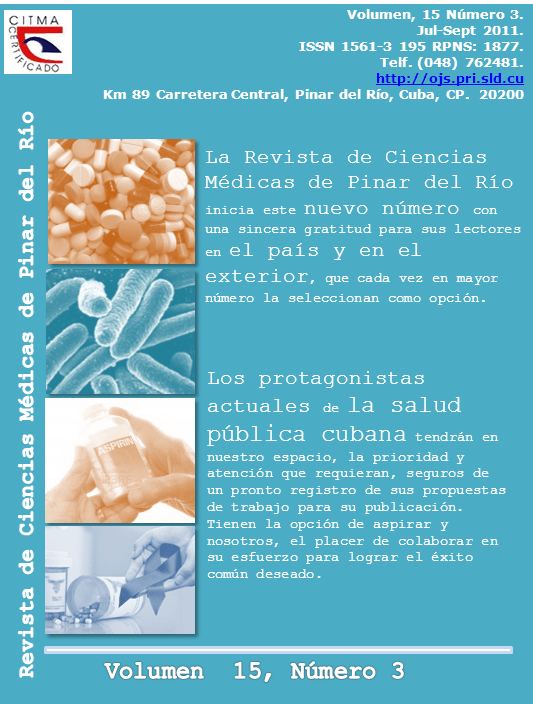Universidad-sociedad su relación en la percepción de médicos de familia y pacientes diabéticos sobre la enfermedad
Palabras clave:
Educación médica, Diabetes mellitus/diagnóstico/dietoterapia.Resumen
Introducción: la Educación Médica Superior cubana actual ha alcanzado grandes avances cualitativos y cuantitativos en todos los aspectos del proceso docente, asistencial e investigativo, transitando hacia una nueva etapa con "la universalización de la universidad".
Objetivo: relacionar el vínculo universidad-sociedad a través del conocimiento de médicos de familia y diabéticos sobre la enfermedad.
Métodos: se realizó un estudio cualitativo de corte transversal en el Consejo Popular Hermanos Cruz del Área de salud donde se incluyeron 22 médicos y 91 pacientes diabéticos tipo 2. Se aplicó una encuesta diferenciada para ambos grupos, además de revisar los programas actuales de la carrera de Medicina, donde se aborda la temática de diabetes mellitus. Resultados: la totalidad de los médicos plantean la necesidad actualizarse en el tratamiento dietético y de la hipoglucemia, ejercicio físico y diabetes, ayuda psicológica, más de la mitad refiere el cuidado de los pies al paciente así como las complicaciones vasculares. Las complicaciones que más presentaron los pacientes fueron la nefropatía, retinopatía y la neuropatía diabética, y las enfermedades cardiovasculares, al investigar sobre la orientación de su enfermedad brindada por el médico de familia, más de la mitad afirma que es buena.
Conclusión: la relación universidad-sociedad debe continuar fortaleciéndose para que de esta forma logre una mayor preparación en la atención a los pacientes diabéticos, todo lo cual redunda en una mejor calidad de vida.
Descargas
Citas
1. García Pérez RP, Antelo Hunt A, Bringas Sosa Y. Impactos de la globalización neoliberal en la salud de la población de los países en desarrollo. MEDICIEGO [revista en la Internet]. 2010[citado 2011 Abr 17]; 16(2) Disponible en: http://www.bvs.sld.cu/revistas/mciego/vol16_02_10/pdf/t15.pdf
2. Organización Mundial de la Salud. Informe sobre la salud en el mundo. La atención primaria de salud, más necesaria que nunca. Ginebra: OMS; 2008.
3. Más Bermejo P. 45 años de la Revista Cubana de Higiene y Epidemiología. Rev Cubana Hig Epidemiol [revista en la Internet]. 2009 Abr [citado 2011 Abr 17]; 47(1): Disponible en: http://scielo.sld.cu/scielo.php?script=sci_arttext&pid=S1561-30032009000100001&lng=es
4. Tercera Convención Internacional de Educación Superior. Primera Conferencia de Educación Médica, EDUMED 2002. Educ Med Super. 2001; 15(1). Disponible en: http://scielo.sld.cu/scielo.php?script=sci_arttext&pid=S0864-21412001000100012&lng=es&nrm=iso&tlng=es
5. Fajardo Tornés YLl, Sánchez García E. Algunas consideraciones sobre la formación didáctica de los alumnos ayudantes en la carrera de Medicina. Educ Med Super [revista en la Internet]. 2010 Jun [citado 2011 Abr 17]; 24(2). Disponible en: http://scielo.sld.cu/scielo.php?script=sci_arttext&pid=S0864-21412010000200008&lng=es
6. Socarrás Suárez MM, Bolet Astoviza M, Lara Rodríguez RF. Vínculo universidad-sociedad a través de la percepción de médicos y pacientes diabéticos sobre su enfermedad. Educ Med Super [revista en la Internet]. 2010 Sep [citado 2011 Abr 17]; 24(3): 290-299. Disponible en: http://scielo.sld.cu/scielo.php?script=sci_arttext&pid=S0864-21412010000300002&lng=es
7. Orlandi González O, Álvarez Seijas E, Castelo Elías-Calles L, Hernández Rodríguez J, Rodríguez Anzardo BR, González Calero TM, et al. Guías cubanas de práctica clínica basadas en la evidencia sobre el pesquisaje, diagnóstico y tratamiento de la diabetes mellitus tipo 2 [monografía en Internet]. Ciudad Habana: INEN; 2010 [citado: 17 de abril de 2011]. Disponible en: http://www.sld.cu/galerias/pdf/sitios/pdvedado/gpc_dm2_final.pdf
8. Acosta Gómez Yi, Montano Luna JA, Díaz Molleda IM, Moreno Domínguez JC, Valdés Mora M. Role of Medical Education Graduated in training as professors of specialists in Integral General Medicine in the new Program of Latin American Physicians Training. Educ Med Super [revista en la Internet]. 2010 Mar [citado 2011 Abr 17]; 24(1): 65-75. Disponible en: http://scielo.sld.cu/scielo.php?script=sci_arttext&pid=S0864-21412010000100008&lng=es
9. Alfonso García A, Mejías Alcázar A. Necesidades de aprendizajes del personal de salud que atiende al adulto mayor. Educ Med Super [revista en la Internet]. 2009 Dic [citado 2011 Abr 17]; 23(4): 194-204. Disponible en: http://scielo.sld.cu/scielo.php?script=sci_arttext&pid=S0864-21412009000400005&lng=es
10. Sally-Anne SD, Stephen Colagiuri RCi. Educación individual del paciente con diabetes mellitus tipo 2 (Revision Cochrane traducida). En: Biblioteca Cochrane Plus 2009 Número 2. Oxford: Update Software Ltd. Disponible en: http://www.bibliotecacochrane.com/BCPGetDocument.asp?SessionID=%202071796&DocumentID=CD005268
11. Vidal Ledo M, Morales Suárez I. Calidad educativa. Educ Med Super [revista en la Internet]. 2010 Jun [citado 2011 Abr 17]; 24(2). Disponible en: http://scielo.sld.cu/scielo.php?script=sci_arttext&pid=S0864-21412010000200013&lng=es
12. Vélez Benito GA, Schwabe FM. Permanent health education. Reflexions in the perspective of integrality. Rev Cubana Enfermer [revista en la Internet]. 2010 Dic [citado 2011 Abr 17]; 26(4): 267-279. Disponible en: http://scielo.sld.cu/scielo.php?script=sci_arttext&pid=S0864-03192010000400010&lng=es
Publicado
Cómo citar
Número
Sección
Licencia
Aquellos autores/as que tengan publicaciones con esta revista, aceptan los términos siguientes:- Los autores/as conservarán sus derechos de autor y garantizarán a la revista el derecho de primera publicación de su obra, el cuál estará simultáneamente sujeto a la Licencia de reconocimiento de Creative Commons que permite a terceros compartir la obra siempre que se indique su autor y su primera publicación esta revista.
- Los autores/as podrán adoptar otros acuerdos de licencia no exclusiva de distribución de la versión de la obra publicada (p. ej.: depositarla en un archivo telemático institucional o publicarla en un volumen monográfico) siempre que se indique la publicación inicial en esta revista.
- Se permite y recomienda a los autores/as difundir su obra a través de Internet (p. ej.: en archivos telemáticos institucionales o en su página web) antes y durante el proceso de envío, lo cual puede producir intercambios interesantes y aumentar las citas de la obra publicada. (Véase El efecto del acceso abierto).



